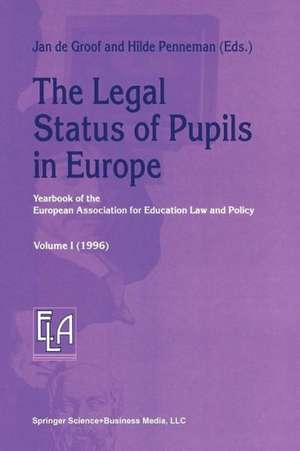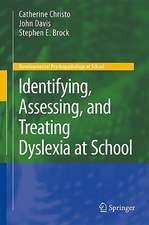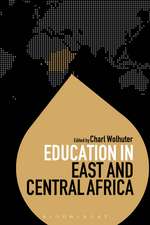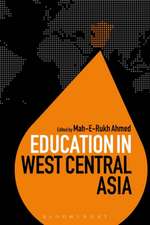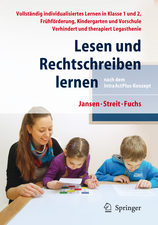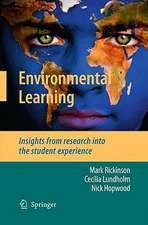The Legal Status of Pupils in Europe: Yearbook of the European Association for Education Law and Policy: Yearbook of the European Association for Education Law and Policy, cartea 1
Editat de Jan De Groof, Hilde Pennemanen Limba Engleză Paperback – 23 aug 2014
| Toate formatele și edițiile | Preț | Express |
|---|---|---|
| Paperback (1) | 399.67 lei 6-8 săpt. | |
| SPRINGER NETHERLANDS – 23 aug 2014 | 399.67 lei 6-8 săpt. | |
| Hardback (1) | 1571.08 lei 6-8 săpt. | |
| Springer – 25 mar 1998 | 1571.08 lei 6-8 săpt. |
Preț: 399.67 lei
Nou
Puncte Express: 600
Preț estimativ în valută:
76.49€ • 79.01$ • 63.66£
76.49€ • 79.01$ • 63.66£
Carte tipărită la comandă
Livrare economică 25 martie-08 aprilie
Preluare comenzi: 021 569.72.76
Specificații
ISBN-13: 9789401168229
ISBN-10: 9401168229
Pagini: 496
Ilustrații: XVIII, 473 p.
Dimensiuni: 155 x 235 x 26 mm
Greutate: 0.69 kg
Ediția:Softcover reprint of the original 1st ed. 1998
Editura: SPRINGER NETHERLANDS
Colecția Springer
Seria Yearbook of the European Association for Education Law and Policy
Locul publicării:Dordrecht, Netherlands
ISBN-10: 9401168229
Pagini: 496
Ilustrații: XVIII, 473 p.
Dimensiuni: 155 x 235 x 26 mm
Greutate: 0.69 kg
Ediția:Softcover reprint of the original 1st ed. 1998
Editura: SPRINGER NETHERLANDS
Colecția Springer
Seria Yearbook of the European Association for Education Law and Policy
Locul publicării:Dordrecht, Netherlands
Public țintă
ResearchCuprins
General Framework.- Current Issues of Children’s Rights.- Legal Status of Pupils — Global Approach — Specific Procedures.- Synoptical Review of the Country Reports.- The Legal Status of Pupils in the European Countries.- The Social and Cultural Rights of Pupils.- The Social and Economic Situation of Pupils from the Perspective of Public International Law.- The Status of the Pupil: A Function of the Rights of the Child.- European Convention of Human Rights: Case-law on the Right to Education.- Specific Subjects of Comparative Educational Law.- Constitutional Aspects of the Legal Status of Pupils (Italy, Portugal, Spain).- Pupils’ Rights in Austria.- Legislation of Special Education Needs in the Baltic States: Development, Rhetoric and Ambiguity.- Special Educational Needs and Access to Justice — The Role of Special Educational Needs Tribunal in England and Wales.- How to Test the Legal Status of Pupils?.- Aspects Récents et Nouveaux du Statut des Élèves des Établissements Scolaires en Droit Français.- Synopsis of Country Reports.- Legal Status of Pupils in Spain with Some Specific Reference to the Case of Catalonia.- The Legal Status of Pupils in The Netherlands.- The Legal Status of Pupils: Austrian Report.- The Legal Status of Pupils in France.- The Legal Status of Pupils in the Flemish-speaking Community of Belgium.- The Legal Status of Pupils in the French-speaking Community of Belgium.- The Legal Status of Pupils in Finland.- The Legal Status of Pupils in Portugal.- The Legal Status of Pupils in German Schools.- The Rights of Pupils and Parents in Sweden.- The Legal Status of Pupils in the United Kingdom.- The Legal Status of Pupils in England and Wales.- The Legal Status of Pupils in Ireland.- The Legal Status of Pupils in the European Union: TheSituation in Ireland.- The Legal Status of Pupils in the European Union: The Situation in the Czech Republic.- The Legal Status of Pupils: Norwegian Law.- Italy: The Legal Status of Pupils. in the School Legislation.- The Legal Status of Pupils in American Education.- The Legal Status of Pupils in the Russian Federation.- Approach to Issues by the South African Association.- The Rights and Duties of Pupils (Learners): Some Basic South African Principles.- Comments on the Position of School Governing Bodies in terms of the New South African School Bill, 1996, with Special Reference to the Admission and Language Policies of Schools.- List of Authors.
Descriere
Descriere de la o altă ediție sau format:
In the centre of the whole educational cosmos stands the pupil, the student. He or she has rights, sanctioned by a national and international judicial apparatus. The freedoms of parents, teachers and education establishments are functional in the service of the rights of the "user of education", as is the government's assignment. They hold a joint responsibility with regard to the right of a young person to be educated, and a fortiori of the school-age young person. The context in which education takes place is nevertheless undergoing major change. In recent times, schools have been presenting themselves more as brittle social institutions, sensitive to internal and external conflicts. If every education establishment is a crossroads of legal relationships, this does not leave the pupil or student untouched. He or she can seek recourse to fundamental rights; but against these can be set certain obligations - and in the first place the obligation to take account of the rights of fellow pupils and students. Educational sociologists have for some time been interested in the rela tionship between the behaviour of pupils and the quality and effectiveness of the school. I Practitioners of law in general, and education law in particular, could not ignore the legal status of the education user. It immediately became apparent how interwoven education is with a diversity of disciplines within the legal domain, as well as with other scientific disciplines.
In the centre of the whole educational cosmos stands the pupil, the student. He or she has rights, sanctioned by a national and international judicial apparatus. The freedoms of parents, teachers and education establishments are functional in the service of the rights of the "user of education", as is the government's assignment. They hold a joint responsibility with regard to the right of a young person to be educated, and a fortiori of the school-age young person. The context in which education takes place is nevertheless undergoing major change. In recent times, schools have been presenting themselves more as brittle social institutions, sensitive to internal and external conflicts. If every education establishment is a crossroads of legal relationships, this does not leave the pupil or student untouched. He or she can seek recourse to fundamental rights; but against these can be set certain obligations - and in the first place the obligation to take account of the rights of fellow pupils and students. Educational sociologists have for some time been interested in the rela tionship between the behaviour of pupils and the quality and effectiveness of the school. I Practitioners of law in general, and education law in particular, could not ignore the legal status of the education user. It immediately became apparent how interwoven education is with a diversity of disciplines within the legal domain, as well as with other scientific disciplines.
